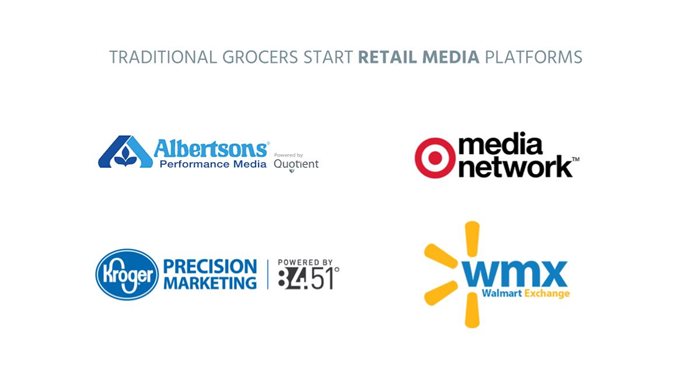Retail media + purchase history = boosting profitability
Retail Media combined with purchase data can boost margins - no wonder Amazon & Alibaba are moving into battle for this. How can retailers strike back?

Where the profit grows
For a few years now, tech-driven challengers have been shaking up the establishment. Not surprisingly, in retail, this disruptor is Amazon. Recently, Amazon announced its Amazon Marketing Services. AMS sounds friendly and down to earth, but given the history of Amazon's “ideas” (from Alexa to Fresh to Prime and WholeFoods), it should not be underestimated. In Fact, AMS could become a global threat for incumbent retailers, devaluing one of their major treasures: purchasing data. Like a plague of locusts, Amazon could swoop in and swallow up the value of other retailer's data. And the same is true for Alibaba.
.jpg?width=700&height=466)
"Advertising has become a multi-billion dollar business and is growing very fast," said Amazon CFO Brian Olsavsky in the telephone conference on the latest quarterly figures.
The average annual growth of the Amazon advertising business between 2015 and 2020 is estimated at 70 percent. And BMO Capital Markets believes that Amazon will see an annual marketing turnover of 19 billion US dollars by the end of this decade. Alibaba, for its part, is already expected to achieve an advertising turnover of about 22 billion dollars this year.
But let's take a step back first, before falling into renewed panic over Amazon's and Alibaba's superiority. It's not too late. Not yet.
The goal: Enriching targeting with real purchase information
Since 2016, retail giants such as Target have been setting up private marketplaces for programmatic ads; Walmart introduced its media platform WMX, Albertsons called the same idea a data-driven media platform and Kroger labelled it Kroger Precision Marketing. What all these platforms have in common is that they enrich targeting criteria with a consumer's purchase history in a programmatic surrounding – leveraging a novel way to monetize data. That means a brand like Coke could plan its next display campaign much more effectively, as such platforms will tell Coke: Consumer A has previously bought Pepsi and consumer B, Coke.

And this is basically the one and only insight brands are truly looking for – purchase history based targeting – to stop the waste of budgets on mistargeted campaigns. As a consequence, socio-demographic targeting will die, as well as pay-per-view models, and budgets will be shifted from media houses to retailers that offer these new, shiny targeting prospects.
In addition to Search and Social, Retail Media will become the third major pillar in the digital advertising market.
“I am sure that some retailers will one day achieve more margin with media revenues than with the sale of goods," says Torsten Ahlers, CEO of the Otto Media Group.
.jpg)
Great news for advertisers
Now, from the perspective of an advertiser like Coke, this is great news. Advertisers will get much better targeting. Currently flying blind, they will now have the chance to establish a deterministic link between the advertising nudge and a purchase – allowing for less wasted coverage losses. ROI will definitely improve, leaving traditional media out in the rain, as well as those retailers who are neither willing nor able to play along. But even Target, Walmart and Albertsons should be prepared for a rough ride with Amazon now introducing AMS. The sheer mass of Amazon's multiple data sources from across so many categories might overwhelm traditional retailers. Having bought WholeFoods, offering Amazon Fresh, and connecting the dots to books, fashion, movies and you name it via Amazon Prime, Amazon has a truly holistic customer view. This applies to all the countries it operates in, making it a global threat.

Retailers can only outsmart Amazon and Alibaba with the latest technology
Should Amazon or Alibaba eventually add the right technology, it will become nearly unbeatable. But their technology isn't that great yet. They are very good at customer centricity, offering an amazing user experience based on one-click shopping, rich delivery options, and a lot of choice. But when it comes to Amazon's recommendations, they leave a lot to be desired. I recently ordered a greek yoghurt via Amazon Fresh, but it was sold out. So Amazon “recommended” an alternative, a creamy, cherry-flavored yoghurt. Now, besides the name “yoghurt”, that's quite a big gap to what I really wanted. And that is because Amazon's algorithms do not understand the true nature and characteristics of a product. They simply look at the dairy category and find similarly named products (“yoghurt”), and their guess is, it must be comparable. But what Amazon doesn't understand are the product's latent properties and the true consumer preferences.
Of course, knowing that a consumer has bought Pepsi is only the first step towards truly efficient targeting. The key questions from a retailer and brand perspective are: (1) if a targeted consumer buys a product offered at a discount, will it be incremental or cannibalizing and (2) what is the consumer’s willingness to pay for the discounted product? Neither question can be answered with data alone. Only an intelligent system can do that.

Equally important: Full focus on the best ROI
Yet the performance of the targeting engine is only half of the true success of these programmatic advertising platforms – be it Amazon's AMS or Walmart's WMX. The second, equally important part is determined by the platforms’ ability to induce users to buy at minimal cost. Or, from a brand perspective, to offer the highest ROI and ROAS possible. As brands will invest into the channel with the highest return on advertising spend (ROAS), a targeting engine should offer more than simple heuristics. Indeed, the platform itself should (1) offer performance-based fees, and get rid of cost-per-view models (the latter being an approach that only benefits the media house, but never the advertiser) and (2) ideally, adapt the applied discounts to each individual consumer's willingness-to-pay instead of applying the same discount to all.
Solutions are available
The good news is that there are solutions available that deeply understand what customers want and deliver a premium ROI. The solutions are powered by engines based on artificial intelligence, machine learning, or neural nets, that autonomously understand
- latent product properties
- consumer preferences
- individual customer's willingness-to-pay per product
- the purchase likelihood at a given time
SO1 (Segment-of-One) is one of the companies that offers just that: a white label programmatic media platform (PMP) based on artificial intelligence, which creates a personalized promotion experience that comes with highly relevant offers at perfect discounts, avoids substitution of planned purchases, decides on the ideal channel and follows brands and retailers’ financial goals to deliver an unparalleled ROI. These kind of solutions are fast to set up and to scale.
The future of advertising is personalized
It's a first mover game. Few retailers will truly monetize their data treasure. Most will be too late or underestimate the importance of a truly intelligent system and the need for a performance based model. But the survivors will prosper – thanks to the massive shift of budgets towards programmatic, and because of the high margins for media (e.g., ComCast and Disney show a EBITDA of more than 30% in comparison to Walmart's ~6.5% or Kroger's ~4.0% EBITDA) and premium targeting business models.
Several articles have reported that Amazon is currently testing a re-targeting tool for display advertising. This allows Amazon retailers to show their customers the appropriate advertising even outside the pages of Amazon to guide them back to Amazon for purchase. A double win for Amazon: earning on advertising and the transaction fees for the purchase.
So retailers better do it smart and fast, before the “locust” Amazon and Alibaba swallow all value from this opportunity and dominate the advertising game. Retailers cannot beat the amount of Amazon's or Alibaba's data nor their determination to kick them out of this margin-boosting opportunity. Retailers have to outsmart them by applying (1) better algorithms that lead to better recommendations for customers and (2) individual discounts adjusted to a customer's willingness-to-pay to stop wasting budgets and (3) a performance-based model that leads to the best ROI for advertisers. Amen.